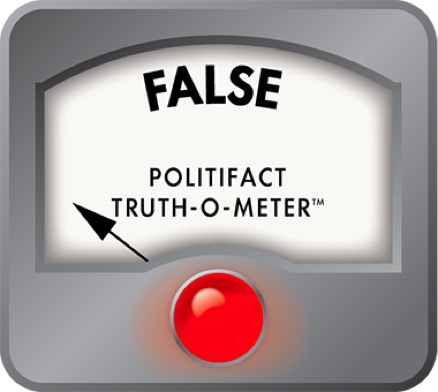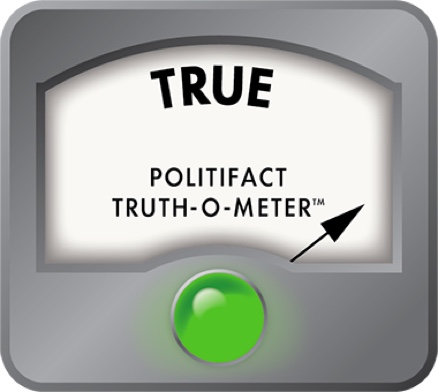Stand up for the facts!
Our only agenda is to publish the truth so you can be an informed participant in democracy.
We need your help.
I would like to contribute
Ever since his initial campaign for governor, Bruce Rauner has been quick to use the word "corrupt" to describe anyone who earns his disapproval.
That list includes his 2014 Democratic opponent, labor union leaders, his 2018 challenger and, without fail, his arch-nemesis Democratic House Speaker Michael Madigan.
But in a recent radio interview, Rauner upped the ante, not only calling three of his prominent Democratic opponents "corrupt" but suggesting one of them will face prosecution.
"I’m being challenged by this guy Pritzker," Rauner said on WJPF-AM near Carbondale in Southern Illinois, referring to his fall challenger, Democrat J.B. Pritzker. "He is a corrupt insider, loyal to Madigan, works for the Chicago machine."
A few minutes later, he criticized his one-time friend, Chicago Mayor Rahm Emanuel, inaccurately claiming Emanuel had received $20 million from special interest groups for his 2019 re-election campaign: "He’s corrupt, he’s part of the problem in Chicago," the governor said.
Then Rauner turned his attention to Madigan, who is the longest-serving state house speaker in the nation.
"Madigan’s the worst. He’s been there 35 years and he’s become a millionaire from high property taxes and his tax appeal law firm," the governor said. "We’ve got to beat these guys. They’re corrupt and they’re just tax cheats and tax-hikers."
That’s when Rauner ratcheted up his claim, arguing that electing his choice as attorney general means criminal charges for Madigan.
"I’m funding Erika Harold. I’m giving her a million dollars, which is a lot of money for me. I need her to win," Rauner said. "Erika Harold will prosecute Madigan and the corruption. She’s awesome."
In Illinois especially, the word "corrupt" can easily connote illegal wrongdoing by government officials who abuse their public power for personal gain.
But the word "corrupt" can also be used to express the opinion that a public official has morally or ethically compromised his or her position—not necessarily that he or she is a criminal.
So even though Rauner took the conversation a big step further by bringing up prosecution—a suggestion for which he has no support—the fact that there are multiple ways to interpret the word means we won’t be putting his accusations to the Truth-O-Meter.
Still, it’s important to understand the context of Rauner’s insinuations.
From 1976 to 2016, there were more than 2,000 public corruption convictions in Illinois, according to U.S. Department of Justice figures. High-profile examples include four former governors, but nowhere in this pantheon of notoriety appear the names Emanuel, Madigan or Pritzker.
"The word 'corruption' for Rauner is a beautiful, deceptive word because it has multiple meanings," said Christopher Mooney, a state politics expert at the University of Illinois’ Institute of Government & Public Affairs.
"And when you say ‘Illinois politics’ and you say ‘corruption,’ one meaning comes immediately to mind," Mooney added, listing high-profile convicted state officials, including imprisoned former Gov. Rod Blagojevich, his predecessor George Ryan and former Secretary of State Paul Powell.
"But he doesn’t have to prove anything because he can fall back on the other definition," Mooney explained.
When asked for clarification, Rauner campaign spokesman Justin Giorgio wrote in an email that the governor was "referring to corruption as a perversion of integrity as a public servant by putting politics and power over the people of Illinois."
Yet Giorgio did not respond to repeated questions about how that definition squared with the governor’s contention that Madigan will face prosecution.
In a news conference the day after his radio appearance, Rauner waffled when asked to clarify whether Madigan had violated the law.
"I don’t know the answer to that," Rauner said, suggesting a new attorney general could lead "investigations" of potential "conflicts of interest and self-dealing" that may unearth illegal acts.
Even if Rauner intended to describe Emanuel and Pritzker as merely ethically corrupt, suggesting Madigan could face charges blurs the line between the arguably unethical and the legally criminal.
Rauner used the same tactic in his 2014 campaign against former Gov. Pat Quinn, going so far as to say the Democrat could be headed for "jail."
To explain his critique of Pritzker, Rauner’s spokesman pointed to well-publicized controversies involving the billionaire Hyatt heir.
Pritzker has faced media scrutiny over the tax status of several offshore companies he owns, along with a hefty tax break he received on his second Gold Coast mansion. And he’s taken heat for questionable conversations he had with Blagojevich recorded by the FBI during its investigation of the former governor.
"Pritzker has used his wealth and influence to dodge taxes and attempted to buy political office from Rod Blagojevich, both examples of unethical insider dealing," wrote Rauner’s spokesman Giorgio.
Critics have attacked Emanuel’s ethics since his days as a congressman, including his coziness to special interests, his use of private email accounts to conduct public business, even questioning how he became a millionaire during a brief hiatus from his myriad public offices. But in the Rauner campaign’s response to our questions, his spokesman did not address Rauner’s rationale for labeling Emanuel "corrupt."
As for Madigan, Giorgio referred to Rauner’s repeated references to Madigan’s tax appeals work, saying that "running a property tax appeal firm in Chicago while passing laws that raise property taxes on hardworking families and businesses" is "a clear conflict of interest."
A 2010 Chicago Tribune investigation found the speaker’s public and private careers have intersected in ways that benefited the clients of his law firm. But Rauner overlooks the fact that property tax rates are set at the local—not state—level.
Yet Rauner himself faced criticism during his first campaign over his connection with companies that broke the law and were owned by his private equity firm. Likewise, Rauner pledged as governor to separate himself from private business investments to avoid potential conflicts of interest. Yet an Associated Press report revealed he arranged a meeting with a former associate at the governor’s mansion in 2015, a decision Rauner attempted to defend this year with a claim we rated False.
Madigan, like Pritzker, Emanuel and Rauner himself, has never been charged—let alone convicted—of criminal activity, as Rauner’s radio remarks suggest he could be, and the campaign backed away from even defending how he might.
Furthermore, there is no evidence that any of them have been formally investigated for the activity Rauner paints with the word corrupt.
Our Sources
"How Illinois became America's failed state," Politico, June 10, 2017
"At campaign stop in West Frankfort, Gov. Rauner calls Pritzker ‘corrupt’ and a ‘tax cheat,’" The Southern, March 23, 2018
"Michael Madigan wins re-election as Democratic Party leader," State-Journal Register, April 23, 2018
Morning Watch interview with Bruce Rauner, WJPF-AM, Aug. 9, 2018"Rauner now says former buddy Rahm is ‘corrupt’ and has ‘got to go,’" Chicago Sun-Times, Aug. 9, 2018
Report: Continuing Corruption in Illinois, University of Illinois at Chicago, May 15, 2018
Email interview: Justin Giorgio, Rauner spokesman, Aug. 13-14, 2018
Audio: Rauner takes questions after Peoria event, via Illinois Central Management Services, Aug. 10, 2018
"State retail merchants group takes pass on governor's race," Chicago Tribune, Oct. 3, 2014
Phone interview: Christopher Mooney, professor of state politics at the University of Illinois, Aug. 13, 2018
"Tribune exclusive: Pritzker's secret offshore holdings revealed in Chicago duck boat land deal," Chicago Tribune, March 14, 2018
"For J.B. Pritzker, mansion’s disrepair has saved $230K in taxes," June 26, 2018
"J.B. Pritzker sought political office from Blagojevich, 2008 FBI wiretaps show," Chicago Tribune, May 31, 2017
"Rahm’s private emails: From clout highway to one-way street for everyday beefs," Chicago Sun-Times, Feb. 25, 2018
"How Did Rahm Make His Millions in Investment Banking?" Chicago Magazine, Feb. 21, 2011
"The Madigan Rules," Chicago Tribune, Jan. 22, 2010
"Rauner firm oversight a focus of governor race," Associated Press, Oct. 26, 2014
"Troubled firm Lason Inc. doesn’t fit Bruce Rauner’s story," Chicago Tribune, Jan. 20, 2014
"Judge says Rauner former firm not responsible for nursing home fraud," Chicago Tribune, Dec. 16, 2014
Phone interview: Michael Polelle, professor emeritus and defamation law expert at John Marshall Law School, Aug. 14, 2018






































